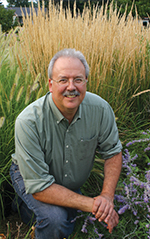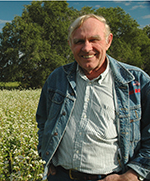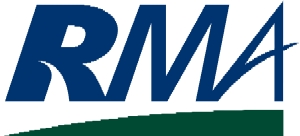
In Sheridan, Wyoming at the Holiday Inn, September 3 & 4
![]() About the Conference
About the Conference
The Living and Working on the Land: Building Blocks of Success conference is for all acreage managers interested in accomplishing more on their property as well as those interested in the future of rural areas. The conference begins on Wednesday, September 3 in Sheridan, Wyoming at 10am and runs through noon on September 4 (and is followed by post-conference activities).
Look for engaging speakers on managing and improving rural enterprises, hands-on workshops, practical sessions, excellent networking, tours and a fun atmosphere. The program features speakers with hands-on knowledge and local food. Professional, sideline and hobby farmers and ranchers, small acreage owners, local food enthusiasts and backyard gardeners will all find something to fit their interests.
The venue will be the Sheridan Holiday Inn (both for the meeting rooms as well as the block of hotel rooms). A special evening event will be at The Loft at 201 in downtown Sheridan Wednesday night.
The Living and Working on the Land conference is planned by UW Extension, the Wyoming Business Council’s Agribusiness Division, and Wyoming’s Small Acreage Issue Team. The primary financial partner is the USDA’s Risk Management Agency which works to promote, support, and regulate sound risk management solutions to preserve and strengthen the economic stability of America’s agricultural producers. The conference has been offered previously in Torrington and Riverton, Wyoming.
Presentation Slides
• Strategies for Transforming Ag to Meet the Future (A Reading List) by Frederick Kirschenman
• Getting Started in Ag - Programs that Help by Cindy Garretson-Weibel, Wyoming Business Council-Agribusiness Division,
A helpful Resources List
• Beginning Beekeeping: A Year in the Life of a Hive by Cliff Reed, Tongue River Apiary
Join professional beekeeper Cliff Reed to learn how he manages a hive from winter through fall. Along the way Cliff will discuss the hive social structure, summer forage in the Midwest, disease and pest management, transporting the hive for pollination of the almond bloom in California, honey and wax marketing and more.
• Health & Safety Requirements for Direct Sales by Linda Stratton, Wyoming Department of Agriculture
Food Safety and Requirements for processing and selling food products such as:
• Raw agricultural products sales
• Value added processed products
• Home Processor – what products and where can be sold
• Eggs – Ungraded and graded egg sales
• Meat and Poultry requirements for sales
• COOL – Country of Origin Labeling
• FSMA – Food Safety Modernization Act
• GAP – Good Agricultural Practices
• Voices from Women on the Range by Lindsay Wood
Join Lindsay Wood in a discussion of the way that the roles of women in ranching have changed, and stayed the same, throughout the past 100 years. We all have an image of the quintessential ranch homemaker. It might be something out of an old western movie or a memory of grandma, but we all have it. We’ll spend some time exploring how close that image is to the modern ranch woman and looking at the ever growing influence of women in both the production and management of livestock.
• Plants with Altitude – Regionally Native Wildflowers for the Garden by Jennifer Thompson, UW Extension Educator
This session will briefly cover the reasons for using native plants in the landscape and what you should keep in mind to successfully grow them. The bulk of the session will then be spent taking a look at and discussing a wide variety of wildflowers well suited to Wyoming gardens.
• Growing Berries and Other Small Fruit in the West – Why not? By Jeff Edwards, UW Extension Specialist
Depending on the interest of the audience, this presentation can focus on the production of bramble berries, strawberries, other small fruit suitable for Wyoming. Information can also be provided on non-native small fruit that may have a fit in Wyoming.
• Energy and Agriculture: A pyramid for Action by Milt Geiger
Improve the profitability and sustainability of your ag enterprise by managing the energy used. Reducing costs and risks and lessening the environmental impact of energy consumption are the first steps. This presentation will discuss a hierarchy of decision making that could change how you use, and even produce, energy.
Also,
Energy and Ag handout.
• Wyoming First/Wyoming Grown by Terri Barr, Wyoming Business Council
• Keeping a Horse Healthy by Scott Cotton, UW Extension Educator
Keeping Your Horse Healthy is a blended presentation covering elements of horse management, grazing management, horse nutrition, horse health care and managing a horse operation. Interaction and discussion will be encouraged so that the focus leans towards the needs of the audience.
• Small-Scale Dairy Farming by Hudson Hill, UW Extension Educator
Before you buy a herd of cattle or goats and a truckload of feed, consider the commitment. Hudson Hill will discuss the options available to potential dairy farmers, including dairy animals, facilities, feed, care, commitment, and marketing. He’ll also address different dairy products to efficiently use your supply of milk.
• Taking Your Project to the Next Level by John Hewlett, UW Extension Specialist
Learn about resources to help: improve management, evaluate feasibility, plan for the future, manage risk, compare alternatives, assess profitability, calculate costs, and more… using your own information to take your projects to the next level.
• Starting with Poultry by Hudson Hill, UW Extension Educator
Chickens are small and very hardy making them in many ways easy to raise. Their needs for feed and shelter are easily met. The eggs and meat you can get from a home flock can be very high quality. And a flock of chickens is an endless source of fascination for the whole family. This session will provide an overview of the requirements for starting and managing a flock of egg and/or meat birds.
• Starting a Horse Boarding Enterprise by Hannah Swanbom, UW Extension Educator
Boarding horses can be trickier than you’d expect. Horses are complex creatures, and their owners are notoriously fussy. So he (or she) must be an experienced horseperson or be willing to become one. We’ll discuss stable management and knowledge that can make the difference between success and failure: common demands, pitfalls, and “drama” management.
Conference Program
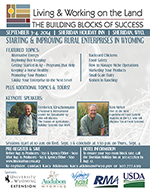 Sessions at the conference will include:
Sessions at the conference will include:
• Beginning beekeeping
• Backyard chickens
• Being a woman on the ranch
• Taking your enterprise to the next level
• Promoting your product through Wyoming programs
• Drama in the barn: managing a horse boarding operation
• Food safety requirements for direct marketing in Wyoming
• Marketing your product: Designing the marketing mix
• Selecting crops that grow in the Mountain West
• Keeping a horse healthy
• Getting started in agriculture: programs that help
• Alternative energy for the farm, ranch and rural residence
• Breakout sessions with keynote speakers Ken Meter and Frederick Kirschenmann
Cllick here to view a program flyer...
Cllick here to view a program brochure...
This year we are very pleased to feature the insights of two renowned agriculturalists. Each will present a keynote session at the conference and then a provide more in-depth discussion at a concurrent session.
|
|||||
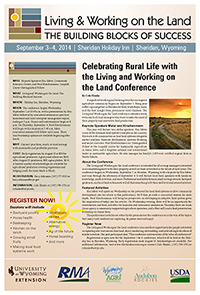 We’re pleased to offer a choice of activities at which you’ll be able to see concepts from the conference at work or to learn in a hands-on environment. Seating will be limited for each event, so indicate your preference when registering.
We’re pleased to offer a choice of activities at which you’ll be able to see concepts from the conference at work or to learn in a hands-on environment. Seating will be limited for each event, so indicate your preference when registering.Wool Mill Tour Mountain Meadow Wool processes the best fiber from the best growers in the West, transforming it into extraordinary wool products. The mill has been in operation since 2007 when Karen Hostetler and Valerie Spanos unsuccessfully searched for products made from local wool. This led them to pursue the creation of a company that sustains ranching and the culture of ranching and of sheep. Today, they work with 16 ranching families for environmental agricultural sustainability and economic opportunity. They currently process 15,000lbs of wool a year and produce 11 types of yarn as well as custom blending and spinning, making them the largest full service spinning mill in the West. Home Food Preservation Workshop Learn the basics for preserving foods safely at home. You will get hands-on experience with water-bath canning and fermentation, and you will even get to take home a jar or two! Location: Joe and Arlene Watt Agriculture Center Room 131 (Sheridan College Campus). Instructors: UW Extension educators Kentz Willis and Vicki Hayman. Cllick here to view a program newspaper insert... |
|||||
|
Early registration by August 15 is: * Agricultural producers - $50 * Agency representatives and others - $100 After August 15: * Agricultural producers - $65 * Agency representatives/Other, $130 A limited number of scholarships are available for agricultural producers covering registration and lodging (until the room block is filled). To register, contact Kacy Atkinson (307) 777-6319 or kacy.atkinson@wyo.gov For information about the conference, contact Cole Ehmke at (307) 766-3782 or cehmke@uwyo.edu |
|||||
|
Contact
|
|||||
|
This project is supported with funds received from the USDA Risk Management Agency.
|
|||||
